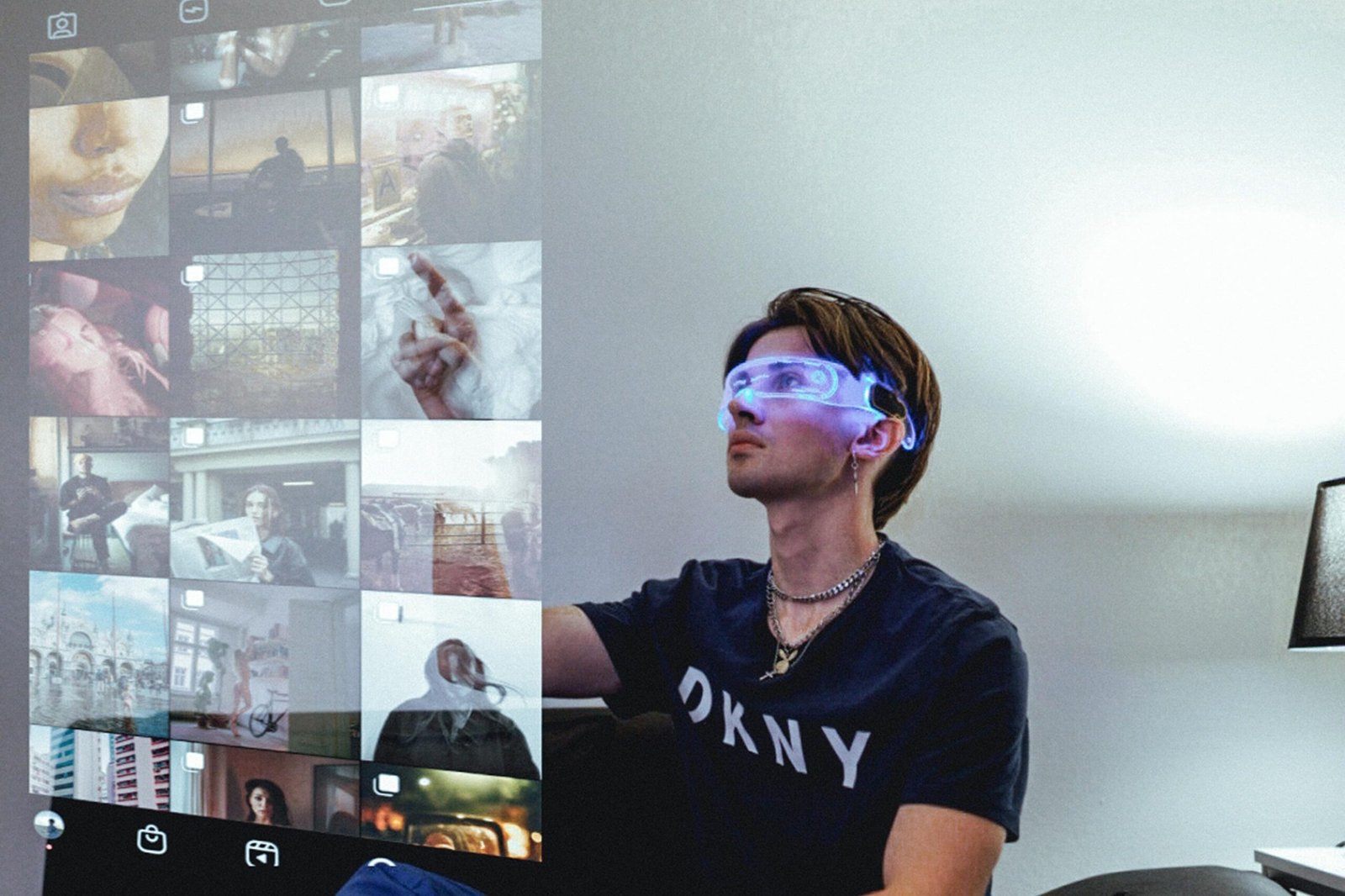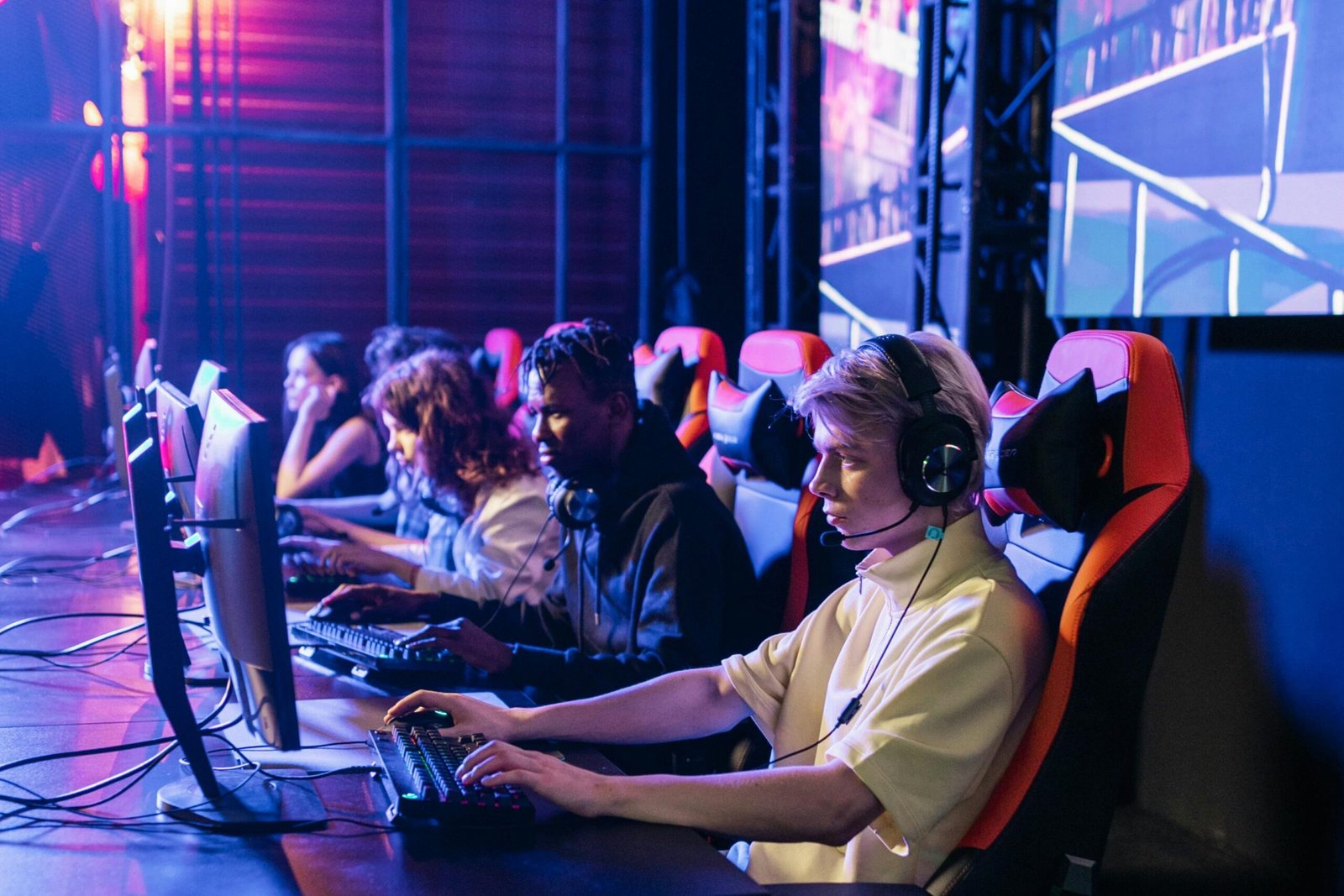Grocery Shopping Becomes a Time Trial

You’ve just walked into your local grocery store, and immediately, your AR glasses take over. Instead of a simple shopping list, a countdown timer appears, and you’re now racing against the clock to find the items. “Find the freshest tomatoes in 30 seconds!” pops up as a challenge, and suddenly, your shopping trip is a time trial. You’re not just picking out groceries anymore—you’re strategizing, dodging aisles, and hunting for the best deals.
As you check off items, your glasses track your progress and even update your personal “best time.” Soon, you realize you’re treating every grocery trip like an in-game quest, trying to beat your last performance. The store transforms into a battleground, with other shoppers potentially your rivals, unknowingly competing for the same high score. Even the checkout process becomes a final boss fight, where speed and accuracy are everything. In the end, you’ve spent more time focused on your AR experience than on the items you actually needed.
Fitness Goals Are Now Boss Fights
Your daily fitness routine, once just about hitting step counts and calories, has evolved into something far more intense. Your AR glasses superimpose an entire game world over your surroundings, turning every jog or walk into an action-packed boss fight. You encounter “obstacles” on your path—hurdles you must jump over, pits to avoid, and power-ups to collect. Each step is a calculated move, and reaching your goal feels like slaying a powerful creature.
While this gamification keeps you engaged, it begins to blur the line between real health and virtual achievements. Every time you complete your run, your glasses reward you with XP and titles like “Master of the Track.” As you level up, the challenges get tougher, and the pressure builds to keep up the performance. What started as a healthy habit now feels like a full-time gaming session where the stakes feel higher than ever—suddenly, missing a run feels like a failure in a game you can’t pause.
Social Interactions Turn into Competitive Leaderboards

Gone are the days of casual chats and spontaneous hangouts. With AR glasses, even your social interactions are now measured against a competitive scale. Conversations with friends, colleagues, or strangers become opportunities to earn “social XP.” After a quick exchange, you can check your glasses to see how well you did, according to an algorithm that rates your communication. Did you crack a good joke? Expect a few bonus points.
But it doesn’t stop there. As your social interactions accumulate XP, you move up in rankings against your peers. Are you a social “noob” or a “legend” in the eyes of your friends? It’s all about the numbers now, with everyone looking for those glowing accolades after a well-received conversation. Eventually, interactions feel more like achievements to unlock, rather than genuine connections. You start wondering if you’re conversing for the pleasure of connecting or to hit a new level.
Virtual Shopping Becomes an Augmented Reality Adventure
Retail therapy takes on a new meaning with AR glasses, transforming the simple act of shopping into a virtual treasure hunt. When you enter a store, your glasses layer the experience with all sorts of info—discounts, product recommendations, and real-time reviews. Each item is like a quest objective, showing stats on its quality and relevance to your style, even providing a virtual try-on feature.
What seems fun at first quickly becomes a game of obsession. You get sucked into completing your “shopping challenges” with a goal of maximizing your rewards, finding the best deals, and unlocking special offers. As you wander through the aisles, your glasses pop up clues to lead you to hidden gems, making you feel like you’re exploring a virtual map. Soon, the idea of just browsing for something you need becomes a mission to “level up” your wardrobe or home décor. The line between necessity and desire gets murky when you’re constantly chasing virtual loot.
Email and Task Management Feels Like an Endless RPG
Managing emails and to-do lists used to be a mundane part of work, but with AR glasses, even these tasks are gamified. Every email you respond to, every task you complete, earns you experience points and unlocks new achievements. The inbox is no longer just a pile of messages to deal with—it’s a quest log full of objectives that you need to conquer. Some tasks even come with side quests or special challenges, pushing you to be more efficient or creative.
Before long, you’re obsessively checking off items, pushing yourself to meet the “next level” by the end of the day. The feeling of accomplishment is powerful, but it starts to feel less like productivity and more like an endless grind. Completing your tasks no longer feels satisfying unless it’s coupled with XP or a shiny new achievement badge. What used to be a routine part of work now feels like a race to finish before the next task pops up. The more you complete, the more you need to complete, until you’re stuck in a never-ending loop of digital rewards.
Traffic Jams Become Racing Challenges
Sitting in traffic has always been frustrating, but with AR glasses, the boredom is replaced by an unexpected game. Your screen overlays racing-style indicators, showing estimated arrival times, the “skill level” of other drivers, and even interactive challenges like “smoothest lane switch” or “most efficient route.” You start seeing your commute less as a daily grind and more as a high-stakes race where strategy matters.
At first, it’s fun—dodging congestion feels rewarding, and earning points for perfect turns makes driving feel smoother. But then, you realize you’re not just trying to get home—you’re competing. You take unnecessary risks just to beat your personal best, swerving lanes like a competitive racer. Soon, every red light feels like a forced pause in the game, making you itch to get back into action. Before you know it, real-world driving feels secondary to the virtual one.
Home Cooking Feels Like a Cooking Sim
Cooking is no longer just about following a recipe—it’s a full-fledged experience complete with visual guides, real-time performance tracking, and skill ratings. Your AR glasses overlay instructions directly onto your counter, showing step-by-step animations for chopping, stirring, and seasoning. Your performance is rated based on speed, accuracy, and even plating aesthetics.
At first, it’s incredibly helpful. You improve your cooking skills, try new recipes, and even earn “master chef” badges for perfecting certain dishes. But then, the pressure builds. Cooking stops being about enjoying the process and becomes a challenge to hit every metric perfectly. Instead of savoring the meal, you’re obsessing over whether you unlocked a new skill level. The joy of food is lost in the relentless pursuit of digital perfection.
Walking the Dog Becomes a Side Quest
What used to be a simple task—taking your dog for a walk—has now been transformed into a mission. Your AR glasses track your route, turning it into an interactive path filled with virtual collectibles, daily distance challenges, and pet-care achievements. Each successful walk adds XP to your “pet owner” status, rewarding you for consistency and engagement.
It’s fun at first. You’re encouraged to explore new routes, and your dog benefits from longer, more interesting walks. But soon, you find yourself walking not just for your dog’s exercise, but for your leaderboard ranking. Missing a day feels like skipping a daily quest, and suddenly, a relaxing walk is a checklist of objectives rather than a moment of peace. You wonder if you’re truly spending time with your pet or just playing another round of the game.
Sleep Tracking Becomes a Competitive Sport
Rest isn’t just about feeling refreshed anymore—it’s about maximizing efficiency. Your AR glasses monitor your sleep patterns, awarding you points based on consistency, depth of sleep, and recovery. The more well-rested you are, the higher your ranking among your “wellness-focused” friends. Sleep is no longer a natural function; it’s a game with winners and losers.
You start tweaking everything—your bedtime routine, your mattress firmness, even your breathing—to hit perfect sleep scores. The moment you wake up, your glasses display your “sleep stats,” making you feel accomplished or frustrated depending on the results. What was once a necessity now feels like a task you must optimize for maximum rewards. Before long, instead of relaxing, you’re strategizing—turning sleep into a mission rather than a break.
Dating Feels Like Unlocking Character Profiles
Romance has never been simple, but now, AR glasses have turned dating into an actual game. When meeting someone, floating stats appear—hobbies, interests, compatibility scores—giving you a digital snapshot before you even say hello. Swiping left and right on apps is old news; now, potential matches appear in real life, each person’s virtual profile hovering above them.
At first, it feels like an advantage. You skip awkward small talk and get straight to the good stuff. But as you keep using it, dating starts feeling like collecting characters rather than forming genuine connections. You begin prioritizing people with the highest “compatibility rating” rather than relying on real chemistry. And when things don’t work out, it feels less like heartbreak and more like losing progress in a game.
Productivity Becomes an Unwinnable Game

With AR glasses, you’re never truly off the clock. Emails, reminders, and notifications float in your field of vision, making it impossible to escape the feeling of being productive. Every completed task gives you experience points, moving you up an invisible corporate leaderboard. The more efficient you are, the more new “quests” appear, turning your work into an endless cycle of achievement hunting.
At first, it feels great. You’re on top of everything, hitting deadlines, and racking up performance streaks. But soon, downtime feels like failure. Resting means falling behind, and even simple things like taking a break feel like missing out on potential rewards. Before you know it, there’s no such thing as work-life balance—just a never-ending grind with no pause button.
Conversations Come with AI Dialogue Prompts
Talking to people used to be spontaneous. Now, AR glasses offer real-time dialogue suggestions, highlighting the best responses based on past conversations and tone analysis. If you’re struggling with small talk, your glasses provide witty one-liners and optimal responses. Suddenly, every conversation feels scripted, like selecting options in a role-playing game.
At first, it seems helpful. You avoid awkward silences, always have something interesting to say, and make a great impression. But then, it becomes addictive. Instead of speaking naturally, you find yourself relying on the AI’s prompts. You start questioning if people like you for who you are or just for how well you follow the “recommended dialogue” options.
Reality Feels Like a Side Quest to the Virtual World
The more you rely on AR glasses, the more reality dissolves into a faded backdrop, like an outdated game running on old hardware. Your morning routine is no longer about waking up naturally—it’s about hitting “morning optimization” streaks for perfect wake-up times, hydration scores, and mindfulness achievements. Your coffee isn’t just coffee; it comes with interactive heat maps, caffeine efficiency trackers, and social leaderboards comparing your choices with friends. You start to feel like a character in a game you never signed up for, completing objectives instead of simply existing. And the worst part? It doesn’t feel optional.
At first, you tell yourself that it’s just a tool, a convenience. But then, real-world decisions start revolving around virtual incentives. You choose restaurants not for the food, but for the highest-rated AR experience. Vacations aren’t about unwinding; they’re about unlocking exclusive location-based badges. Conversations lose spontaneity, replaced by suggested AI-driven prompts and emotion trackers subtly nudging your responses. You find yourself double-checking your words—not for sincerity, but for how well they rank in social engagement metrics. Eventually, real life becomes just another feature in the larger system, a side quest in a never-ending game where the main storyline is controlled by an algorithm. And the scariest realization of all? You don’t know if you can ever log out—because the game isn’t just something you play anymore. The game is you.
